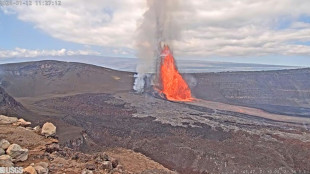
-
 Szoboszlai plays hero and villain in Liverpool's FA Cup win
Szoboszlai plays hero and villain in Liverpool's FA Cup win
-
Hawaii's Kilauea volcano puts on spectacular lava display

-
 US stocks at records despite early losses on Fed independence angst
US stocks at records despite early losses on Fed independence angst
-
Koepka rejoins PGA Tour under new rules for LIV players

-
 Ex-France, Liverpool defender Sakho announces retirement
Ex-France, Liverpool defender Sakho announces retirement
-
Jerome Powell: The careful Fed chair standing firm against Trump

-
 France scrum-half Le Garrec likely to miss start of Six Nations
France scrum-half Le Garrec likely to miss start of Six Nations
-
AI helps fuel new era of medical self-testing

-
 Leaders of Japan and South Korea meet as China flexes muscles
Leaders of Japan and South Korea meet as China flexes muscles
-
Trump sets meeting with Venezuelan opposition leader, Caracas under pressure

-
 Australia captain Alyssa Healy to retire from cricket
Australia captain Alyssa Healy to retire from cricket
-
US 'screwed' if Supreme Court rules against tariffs: Trump

-
 NATO, Greenland vow to boost Arctic security after Trump threats
NATO, Greenland vow to boost Arctic security after Trump threats
-
Israel to take part in first Eurovision semi-final on May 12

-
 How Alonso's dream Real Madrid return crumbled so quickly
How Alonso's dream Real Madrid return crumbled so quickly
-
Ex-Fed chiefs, lawmakers slam US probe into Jerome Powell

-
 Former Panama leader on trial over mega Latin America corruption scandal
Former Panama leader on trial over mega Latin America corruption scandal
-
Trump keeping Iran air strikes on the table: White House

-
 Paramount sues in hostile bid to buy Warner Bros Discover
Paramount sues in hostile bid to buy Warner Bros Discover
-
Ugandan opposition leader Bobi Wine warns of protests if polls rigged

-
 Airbus delivers more planes in 2025
Airbus delivers more planes in 2025
-
Alonso leaves Real Madrid, Arbeloa appointed as coach

-
 UK pays 'substantial' compensation to Guantanamo inmate: lawyer
UK pays 'substantial' compensation to Guantanamo inmate: lawyer
-
Iran protest toll mounts as government stages mass rallies

-
 Gold hits record high, dollar slides as US targets Fed
Gold hits record high, dollar slides as US targets Fed
-
Cuba denies being in talks with Trump on potential deal

-
 Scientists reveal what drives homosexual behaviour in primates
Scientists reveal what drives homosexual behaviour in primates
-
Venezuela releases more political prisoners as pressure builds

-
 15,000 NY nurses stage largest-ever strike over conditions
15,000 NY nurses stage largest-ever strike over conditions
-
Rosenior plots long Chelsea stay as Arsenal loom

-
 Zuckerberg names banker, ex-Trump advisor as Meta president
Zuckerberg names banker, ex-Trump advisor as Meta president
-
Reza Pahlavi: Iran's ex-crown prince dreaming of homecoming

-
 Venezuela releases more political prisoners
Venezuela releases more political prisoners
-
Kenya's NY marathon champ Albert Korir gets drug suspension

-
 US prosecutors open probe of Fed chief, escalating Trump-Powell clash
US prosecutors open probe of Fed chief, escalating Trump-Powell clash
-
Russian captain in fiery North Sea crash faces UK trial

-
 Carrick is frontrunner for interim Man Utd job: reports
Carrick is frontrunner for interim Man Utd job: reports
-
Iran government stages mass rallies as alarm grows over protest toll

-
 Variawa leads South African charge over Dakar dunes
Variawa leads South African charge over Dakar dunes
-
Swiss inferno bar owner detained for three months

-
 Heathrow airport sees record high annual passenger numbers
Heathrow airport sees record high annual passenger numbers
-
Georgia jails ex-PM for five years amid ruling party oustings

-
 Kyiv buries medic killed in Russian drone strike
Kyiv buries medic killed in Russian drone strike
-
Israel revokes French researcher's travel permit

-
 India and Germany seek to boost defence industry ties
India and Germany seek to boost defence industry ties
-
French coach and football pundit Rolland Courbis dies at 72

-
 UK regulator opens probe into X over sexualised AI imagery
UK regulator opens probe into X over sexualised AI imagery
-
AFCON organisers investigate incidents after Algeria-Nigeria clash

-
 US Fed chief warns of 'intimidation' after criminal subpoenas
US Fed chief warns of 'intimidation' after criminal subpoenas
-
Gold hits record high, dollar falls as US targets Fed


Single heat wave wiped out millions of Alaska's dominant seabird
The common murre, a large black-and-white seabird native to northern waters, has become far less common in Alaska over the past decade due to the impacts of climate change.
A study published Thursday in Science reveals that a record-breaking marine heat wave in the northeast Pacific from 2014 to 2016 triggered a catastrophic population collapse, wiping out four million birds -- about half the species in the region.
Strikingly, they have shown little signs of rebounding, suggesting long-term shifts in the food web that have locked the ecosystem into a troubling new equilibrium.
"There's a lot of talk about declines of species that are tied to changes in temperature, but in this case, it was not a long term result," lead author Heather Renner of the Alaska Maritime National Wildlife Refuge told AFP.
"To our knowledge, this is the largest mortality event of any wildlife species reported during the modern era," she and her colleagues emphasized in their paper.
The finding triggers "alarm bells," Renner said in an interview, as human-caused climate change makes heat waves more frequent, intense, and longer-lasting.
- Emaciated Carcasses -
With their dapper, tuxedoed look, common murres are sometimes called the "penguins of the north."
Their slender wings power them across vast distances in search of food and make them expert divers. But even these hardy seabirds were no match for an unprecedented environmental catastrophe.
The largest marine heat wave ever recorded began in the late fall of 2014, spanning a massive swath of the northeast Pacific Ocean from California to Alaska.
It persisted for over two years, leaving devastation in its wake. During this time, some 62,000 emaciated murres washed ashore along the North American Pacific coastline -- dead or dying from starvation.
Experts point to two key reasons for the bird deaths: elevated ocean temperatures reduced both the quality and quantity of phytoplankton, impacting fish like herring, sardines, and anchovies -- the mainstay of the murre diet.
At the same time, warmer waters increased the energy demands of larger fish, such as salmon and Pacific cod, which compete with murres for the same prey.
"We knew then it was a big deal, but unfortunately, we couldn't really quantify the effects," explained Renner.
For years after the event, breeding colonies failed to produce chicks, complicating efforts to assess the full impact.
Earlier estimates pegged the number of deaths at around a million, but a more robust analysis -- drawing on data from 13 murre colonies -- revealed the toll was four times higher.
"It is just so much worse than we thought it was," Renner said of the new findings.
- Climate winners and losers -
The marine heat wave didn't just impact common murres. Pacific cod stocks collapsed, king salmon populations dwindled, and as many as 7,000 humpback whales perished.
Yet the crisis created an uneven playing field: some species emerged unscathed, while others even thrived.
Thick-billed murres, which often share nesting cliffs with common murres, were largely unaffected, possibly due to their more adaptable diet, Renner noted.
For common murres, however, the fallout lingers. Despite nearly a decade since the heat wave, their numbers show no sign of bouncing back -- and the losses may well be permanent.
Part of the reason lies in the long-term decline of some of their prey.
Another factor is murres' survival strategy relies on numbers: they aggregate in massive colonies to protect their eggs from opportunistic predators like eagles and gulls.
With their populations slashed, these birds have lost their critical safety buffer.
Still, Renner offered a glimmer of hope.
While addressing global warming is essential for curbing long-term climate change, conservation efforts can make a difference in the short term, she said.
Removing invasive species like foxes and rats from murre nesting islands could also provide the beleaguered birds with a fighting chance.
W.AbuLaban--SF-PST



